Fingerprinting can be used to verify the validity of biofuels and detect fraud in marine fuel supply chains. It also identifies the feedstock origins of FAME-based biofuels used in the shipping industry. A new method that generates a fingerprint for Fatty Acid Methyl Esters (FAME) bio bunker fuels was presented in the most recent paper from the Global Centre for Maritime Decarbonization (GCMD) on Monday, December 2.
The feedstock origins of the FAME-based biofuels utilized in the shipping sector are identified by this fingerprint. As the maritime industry uses biofuels like FAME more and more to cut its greenhouse gas emissions, GCMD stated that FAME fingerprinting is necessary. As a result, questions have been raised about the validity of biofuels and their sustainability.
Biofuels that are supposed to be made from recycled oils and fats are increasingly being mislabeled by industry associations, and there are still concerns that they may be made from less sustainable and less expensive virgin oils.
The foundation of FAME fingerprinting is the idea that feedstock transesterification can maintain the fatty acid profile of FAME, which is specific to its feedstock. The origin of the feedstock can then be determined by comparing the “fingerprint” to a database of recognized fatty acid profiles.
In order to do sample analyses utilizing a gas chromatograph with flame-ionization detection—an apparatus frequently seen in fuel test laboratories—GCMD collaborated with VPS, who adjusted the current fuel testing procedures. The study takes roughly an hour, which is about the same amount of time as the supply chain’s existing marine fuel quality testing.
Tags: Bio Bunker, FAME, GCMD



Recent Posts
EST-Floattech Expands Octopus Series with Lithium Iron Phosphate Battery Modules
PowerCell’s Marine System 225 receives Type Approval from Lloyd’s Register
Echandia Secures SEK 325 Million in Funding to Advance Maritime Electrification
Scotland’s Largest Maritime Decarbonisation Project Launches at Port of Aberdeen
Fortescue, GH2, and Trovio Complete First Digital Fuel Certificate Pilot for Ammonia Bunkering in Rotterdam
Fortescue Recognised as Global Leader in ‘Real Zero’ Climate Action
Bureau Veritas Urges Rethink of Maritime Finance and Operations in New Book on Sustainable Blue Economy
APM Terminals Pier 400 Deploys Largest Electric Terminal Tractor Fleet at Port of Los Angeles